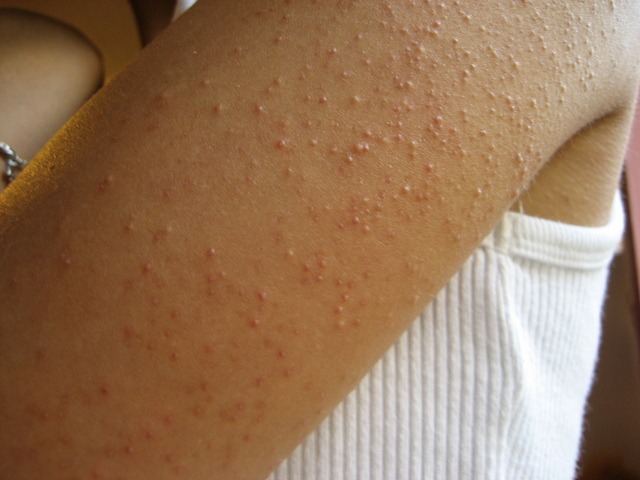How do you get rid of keratosis pilaris?
A healthy skin is more than just visible clear skin and free from blemishes. Having healthy skin can boost a person’s look or appearance. This will then make a person have great confidence which helps to boost their quality of life. However, not everyone is born with beautiful skin or with healthy skin. Some skin issues may easily be solved with over-the-counter medicine or skincare from drugstores. However, keratosis pilaris is one of the skin issues that may be confused with other skin issues and makes it difficult to achieve healthy skin. We will learn about keratosis pilaris in this DoctorOnCall’s article.
Keratosis pilaris is a skin condition characterised by the small, rough bumps or patches. It is actually a common skin condition. Some people may say it resembles the skin of a plucked chicken or as if when getting goosebumps. The fact that that is so common is shown as a normal variant of skin. Keratosis pilaris can occur at any age. Typically, it appears in early childhood. It then progresses as a person reaches adulthood. It is estimated that this skin condition affects more than half of both teenagers population and almost half of the adults. Number can be more than this as most cases of keratosis pilaris are not reported as it typically does not cause severe health issues.
Keratosis pilaris is associated with other skin conditions such as atopic dermatitis and ichthyosis vulgaris. It is also associated with many other conditions besides skin such as diabetes mellitus, obesity and malnutrition. As a matter of fact, it may be presented with those having syndrome such as Down syndrome. It is exactly known the cause for keratosis pilaris. Keratosis pilaris is more obvious during winter months, possibly due to low moisture in the air. It tends to feel better in summer.
However, there are theories supporting how it occurs. It is mainly due to the abnormal keratinisation of the skin. Normally, keratinisation occurs to help the skin become better by ensuring the keratin (a type of protein) fills the hair follicle instead of exfoliating. Thus, when abnormal keratinisation occurs, the keratin becomes excessive and blocks the hair follicle or skin pores. This is how the bumps are formed. Most common cause leading to the build-up of keratin is due to genetic conditions, specifically mutations in filaggrin.
Symptoms of keratosis pilaris are the acne-like lumps or bumps that make the skin look rough. The bumps can be skin-coloured, brown or red. At times, it can be itchy and causes redness around the bumps. The bumps are commonly found on skin areas that tend to be dry such as the face, upper arms, chest, buttocks and thighs. The skin may have sandpaper-like surfaces. The bumps may also contain an ingrown hair. Scarring may be found in severe cases.
Doctors usually diagnose this skin condition by using dermoscopy as it can give a clear picture of the skin and the hair shafts. Dermatoscopy is the examination of skin using a dermatoscope. In some cases, doctors may need to run additional tests such as punch biopsy. Punch biopsy is a procedure removing the full thickness of the skin. In general, doctors can suspect a keratosis pilaris based on history and physical findings alone.
Since keratosis pilaris can cause symptoms that may be annoying to some or even quite a discomfort, you probably wonder what you can do to get rid of it. Below are what you can do to help improve the appearance of the skin:
- Ensure skin are well moisturised
- Avoid using perfumed soap or bath products as it may cause dry skin
- If you want to scrub your skin, do it gently and avoid harsh scrubs
- Have cool or lukewarm when taking bath or shower
- Avoid picking and scratching the skin
- To dry skin after bath or shower, gently pat the skin and avoid rubbing motion
- Try to not wearing tight clothes as it can cause friction to the skin
- Get medicated creams such as retinoids, urea, salicylic acid, lactic acid or alpha-hydroxy acid to remove dead skin and excess keratin
In the severe case of keratosis pilaris, doctors may prescribe steroid creams or laser treatments to help ease symptoms. Keratosis pilaris is considered a mild condition in most cases. This mild condition often does not require medical treatment and it tends to go away when a person reaches the age of 30. However, if symptoms are indeed causing discomfort or anxiety, talking to a doctor would be a better choice.
It can be concluded that keratosis pilaris is a harmless skin condition. It is a common skin problem at any age. It is characterised by the small bumps resembling acne with rough surfaces. Most cases will clear up when a person reaches adults. There is no cure for keratosis pilaris but there are treatments to cope with the condition.












